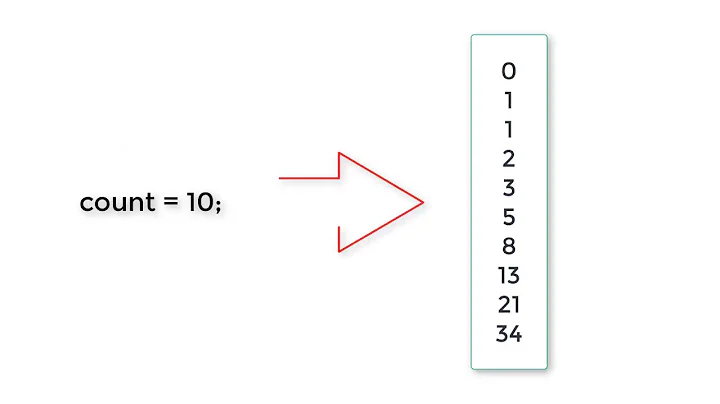Generating Fibonacci series in F#
Solution 1
First of all, you're using let as if it was a statement to mutate a variable, but that's not the case. In F#, let is used to declare a new value (which may hide any previous values of the same name). If you want to write code using mutation, then you need to use something like:
let c = a + b // declare new local value
l.Add(c)
a <- b // mutate value marked as 'mutable'
b <- c // .. mutate the second value
The second issue with your code is that you're trying to mutate F# list by adding elements to it - F# lists are immutable, so once you create them, you cannot modify them (in particular, there is no Add member!). If you wanted to write this using mutation, you could write:
let fabList =
// Create a mutable list, so that we can add elements
// (this corresponds to standard .NET 'List<T>' type)
let l = new ResizeArray<_>([1;2])
let mutable a = 1
let mutable b = 2
while l.[l.Count - 1] < 400 do
let c = a + b
l.Add(c) // Add element to the mutable list
a <- b
b <- c
l |> List.ofSeq // Convert any collection type to standard F# list
But, as others already noted, writing the code in this way isn't the idiomatic F# solution. In F#, you would use immutable lists and recursion instead of loops (such as while). For example like this:
// Recursive function that implements the looping
// (it takes previous two elements, a and b)
let rec fibsRec a b =
if a + b < 400 then
// The current element
let current = a + b
// Calculate all remaining elements recursively
// using 'b' as 'a' and 'current' as 'b' (in the next iteration)
let rest = fibsRec b current
// Return the remaining elements with 'current' appended to the
// front of the resulting list (this constructs new list,
// so there is no mutation here!)
current :: rest
else
[] // generated all elements - return empty list once we're done
// generate list with 1, 2 and all other larger fibonaccis
let fibs = 1::2::(fibsRec 1 2)
Solution 2
Other posts tell you how to write the while loop using recursive functions. This is another way by using the Seq library in F#:
// generate an infinite Fibonacci sequence
let fibSeq = Seq.unfold (fun (a,b) -> Some( a+b, (b, a+b) ) ) (0,1)
// take the first few numbers in the sequence and convert the sequence to a list
let fibList = fibSeq |> Seq.takeWhile (fun x -> x<=400 ) |> Seq.toList
for explanation, please ref solution 2 in F# for Project Euler Problems, where the first 50 Euler problems are solved. I think you will be interested in these solutions.
Solution 3
let rec fibSeq p0 p1 = seq {
yield p0
yield! fibSeq p1 (p0+p1)
}
Solution 4
Here's an infinite tail-recursive solution using sequence expressions. It's quite efficient, producing the 100,000th term in just a few seconds. The "yield" operator is just like C#'s "yield return", and the "yield!" operator may be read as "yield all", where in C# you would have to do "foreach item ... yield return item".
https://stackoverflow.com/questions/2296664/code-chess-fibonacci-sequence/2892670#2892670
let fibseq =
let rec fibseq n1 n2 =
seq { let n0 = n1 + n2
yield n0
yield! fibseq n0 n1 }
seq { yield 1I ; yield 1I ; yield! (fibseq 1I 1I) }
let fibTake n = fibseq |> Seq.take n //the first n Fibonacci numbers
let fib n = fibseq |> Seq.nth (n-1) //the nth Fibonacci number
This approach is similar to the following in C# (which uses a while(true) loop instead of recursion):
Finding Fibonacci sequence in C#. [Project Euler Exercise]
Solution 5
Yes, mutable variables and while loops are usually a good sign that your code is not very functional. Also the fibonacci series, doesn't start with 1,2 - it starts with 0,1 or 1,1 depending on who you ask.
Here's how I'd do it:
let rec fabListHelper (a:int,b:int,n:int) =
if a+b < n then
a+b :: fabListHelper (b, a+b, n)
else
[];;
let fabList (n:int) = 0 :: 1 :: fabListHelper (0,1, n);;
(*> fabList 400;;
val it : int list = [0; 1; 1; 2; 3; 5; 8; 13; 21; 34; 55; 89; 144; 233; 377]*)
Related videos on Youtube
photo_tom
I'm an "experienced" programmer who has made a point of never doing the same job twice. As a result, I've gotten so that I prefer projects that don't just use one technology, but a collection of related ones. Primarily a Windows programmer who loves .Net, but native c++/Qt/Boost comes in a close second. The world of programming is an interesting place that is changing at an ever faster pace. There are so many new and really wonderful ideas, frameworks, library, etc, being released every day that is is like drinking from a fire hose to keep up. But who is complaining
Updated on January 11, 2020Comments
-
photo_tom over 4 years
I'm just starting to learn F# using VS2010 and below is my first attempt at generating the Fibonacci series. What I'm trying to do is to build a list of all numbers less than 400.
let fabList = let l = [1;2;] let mutable a = 1 let mutable b = 2 while l.Tail < 400 do let c = a + b l.Add(c) let a = b let b = cMy first problem is that on the last statement, I'm getting an error message "Incomplete structured construct at or before this point in expression" on the last line. I don't understand what I'm doing wrong here.
While this seems to be an obvious way to build the list in a fairly efficient way (from a c++/C# programmer), from what little I know of f#, this doesn't seem to feel to be the right way to do the program. Am I correct in this feeling?
-
Matti Virkkunen almost 14 yearsYes, you're doing it wrong. You're using a functional programming language like a procedural one. Try doing it without using
whileor any similar loop constructs at first.
-
-
sepp2k almost 14 yearsa) This is a terribly inefficient way to calculate a fibonacci number and b) using this to create a list is even less efficient because you have to calculate the whole thing again for each item in the list.
-
photo_tom almost 14 yearsThanks for the detailed answer. Immutablity as a normal programming mode is something that I'm still trying to get use to and your explanation clarified concepts for me. Not to mention functional programming.
-
Tomas Petricek almost 14 years@photo_tom: That's how all of us who have imperative background feel for the first time :-). Immutability is one of the essential concepts and the rest of functional ideas follow from that.
-
 Rune FS almost 14 yearsVery nice answer. One point worthwhile mentioning would be the fact that as a general approach when creating recursive functions the Call to the function it self should always be the last operation in that particular branch so that a tail Call optimization Can be performed. In this particular case with 400 as the limit a stackoverflow is of cause usually not an issue
Rune FS almost 14 yearsVery nice answer. One point worthwhile mentioning would be the fact that as a general approach when creating recursive functions the Call to the function it self should always be the last operation in that particular branch so that a tail Call optimization Can be performed. In this particular case with 400 as the limit a stackoverflow is of cause usually not an issue -
photo_tom almost 14 yearsThanks for link - for F# for Project Euler Problems. I am working on some of those problems to help learn F#.
-
Onorio Catenacci almost 14 yearsfabListHelper wouldn't be tail-call optimized would it? I mean the cons "a+b::fabListHelp(b,a+b,n)" prevents tail call optimization doesn't it?
-
photo_tom almost 14 yearsC# use of yield is something I'm going to have to work on. A completely new way of thinking about yield. I'm just learning F#, so f# answer is cool, but makes my head hurt trying to understand it. Thanks!!!
-
Stephen Swensen almost 14 yearsIndeed! I picked up the Expert F# book in 2008, read through it and absorbed as much as I could, but wasn't really ready for it at that time. However, it got me experimenting with yield/IEnumerable and delegates in C# at my day job (even pre-linq C# 2.0 has those features), and I've found now, two years later, I'm having a much easier time tacking F# in earnest.
-
 Be Brave Be Like Ukraine over 11 yearsYour answer seems to be a duplicate of @DavidReihans'. Also, as noted in comments to other questions, this approach is neither effective nor tail-recursive.
Be Brave Be Like Ukraine over 11 yearsYour answer seems to be a duplicate of @DavidReihans'. Also, as noted in comments to other questions, this approach is neither effective nor tail-recursive. -
Mike about 11 yearsI think the first line should actually be: let fibSeq = Seq.unfold (fun (a,b) -> Some( a+b, (a+b, a) ) ) (0,1)
-
rmunn almost 8 yearsDownvoted because bare code, with no explanation, is not likely to help an OP who describes himself as "just starting to learn F#".
-
Charly about 7 yearsThe F# for Project Euler Problems website has expired, here's an archive: web.archive.org/web/20120702222856/http://…
-
 Grozz almost 7 yearsnp. I agree with the reason.
Grozz almost 7 yearsnp. I agree with the reason. -
 Pontus Hultkrantz over 5 yearsNice, infinite sequence to be evaluated lazily. Just don't try to convert the infinite seq to an array or List, unless you have a lot of RAM ;).
Pontus Hultkrantz over 5 yearsNice, infinite sequence to be evaluated lazily. Just don't try to convert the infinite seq to an array or List, unless you have a lot of RAM ;). -
Srivathsa Harish Venkataramana almost 4 yearsIt is worth noting to pipe fibSeq to Seq.Cache for better performance









